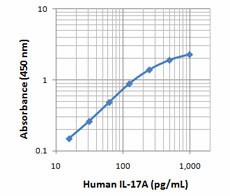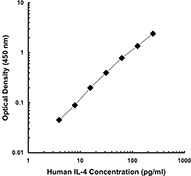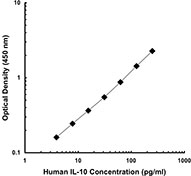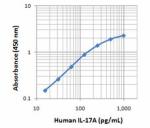- Clone
- Poly5189 (See other available formats)
- Regulatory Status
- RUO
- Other Names
- Interleukin IL-17A, IL-17, Cytotoxic T lymphocyte-associated antigen 8 (CTLA-8)
- Isotype
- Goat Polyclonal Ig
- Ave. Rating
- Submit a Review
- Product Citations
- publications

| Cat # | Size | Price | Quantity Check Availability | Save | ||
|---|---|---|---|---|---|---|
| 518902 | 50 µg | $375 | ||||
IL-17A is the founding member of the IL-17 family, a group of six structurally related pro-inflammatory cytokines. IL-17A, secreted by activated CD4+ Th17 cell subpopulation, elicits multiple biological activities on a variety of cells including: the induction of IL-6, IL-8, G-CSF, and PGE2 production in epithelial, endothelial or fibroblasts; the enhancement of surface expression of ICAM-1 in fibroblasts; activation of NF-κB and costimulation of T cell proliferation. Recent studies demonstrated that, in mice, activated IL-17-secreting CD4+ helper T cells (Th17 cells) mediate an autoimmune arthritis that clinically and immunologically resembles rheumatoid arthritis (RA). Human IL-17A shows 63%, 63%, and 72% amino acid sequence identity to rat IL-17A, mouse IL-17A, and a protein encoded by the ORF13 gene of herpesvirus Saimiri (HVS), respectively.
Product DetailsProduct Details
- Verified Reactivity
- Human
- Antibody Type
- Polyclonal
- Host Species
- Goat
- Immunogen
- Recombinant human IL-17A, amino acids Ile20-Ala155 (Accession # NM_002190) was expressed in E. coli.
- Formulation
- Phosphate-buffered solution, pH 7.2, containing 1% BSA (USA origin) and 0.09% sodium azide.
- Preparation
- The antibody was purified by affinity chromatography and conjugated with biotin under optimal conditions.
- Concentration
- 0.2 mg/ml
- Storage & Handling
- The antibody solution should be stored undiluted between 2°C and 8°C. Do not freeze.
- Application
-
ELISA Detection - Quality tested
- Recommended Usage
-
Each lot of this antibody is quality control tested by ELISA assay. For use as an ELISA detection antibody, a concentration range of 0.25-1 µg/ml is recommended. It is recommended that the reagent be titrated for optimal performance. To obtain a linear standard curve, serial dilutions of IL-17A recombinant protein ranging from 1000 to 15.6 pg/ml are recommended.
- Application Notes
-
ELISA Detection: The biotinylated Poly5189 antibody is useful as a detection antibody for a sandwich ELISA assay, when used in conjunction with purified BL23 (Cat. No. 512702) antibody as the capture antibody and recombinant human IL-17A (Cat. No. 570509) as the standard.
- Product Citations
-
- RRID
-
AB_2561347 (BioLegend Cat. No. 518902)
Antigen Details
- Structure
- Cytokine; dimer; ~15 kD (Mammalian)
- Bioactivity
- Secretion of IL-6, IL-8, G-CSF, prostaglandin E2 by epithelial, endothelial or fibroblastic cells; stimulates cell migration, cord formation, and IL-6 secretion by stromal cells
- Cell Sources
- Activated T cell subpopulation
- Cell Targets
- Fibroblasts, epithelial and endothelial cells, stromal cells
- Cross
- In sandwich ELISA, cross-reactivity with human IL-17F is negligible and no cross-reactivity with mouse IL-17A is present.
- Receptors
- IL-17R
- Biology Area
- Cell Biology, Neuroinflammation, Neuroscience
- Molecular Family
- Cytokines/Chemokines
- Antigen References
-
1. Hirota K, et al. 2007. J. Exp. Med. 204:41.
2. Furuzawa-Carballeda J, et al. 2007. Autoimmun. Rev. 6:169.
3. Witowski J, et al. 2007. Kidney Int. 71:514.
4. Gaffen SL, et al. 2006. Vitam. Horm. 74:255.
5. Hymowitz S, et al. 2001. EMBO J. 20:5332. - Gene ID
- 3605 View all products for this Gene ID
- UniProt
- View information about IL-17A on UniProt.org
Related FAQs
- How many biotin molecules are per antibody structure?
- We don't routinely measure the number of biotins with our antibody products but the number of biotin molecules range from 3-6 molecules per antibody.
Other Formats
View All IL-17A Reagents Request Custom Conjugation| Description | Clone | Applications |
|---|---|---|
| Biotin anti-human IL-17A | Poly5189 | ELISA Detection |
Customers Also Purchased




Compare Data Across All Formats
This data display is provided for general comparisons between formats.
Your actual data may vary due to variations in samples, target cells, instruments and their settings, staining conditions, and other factors.
If you need assistance with selecting the best format contact our expert technical support team.
 Login/Register
Login/Register 













Follow Us